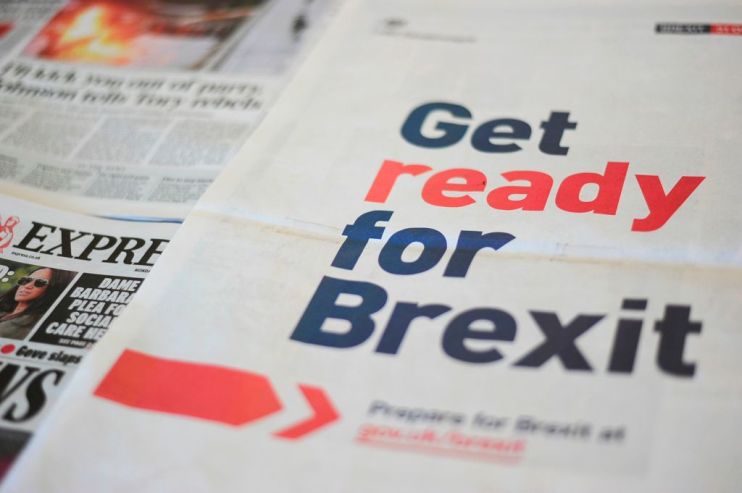Friday marks the end of the beginning of the Brexit battle

One of Winston Churchill’s many gifts was his ability to summon the force of his rhetoric as a means of divining the feeling of the British nation.
His passionate invocations in the dark days of the summer of 1940, when the UK stood alone against the Nazi menace, were masterpieces of fighting spirit, helping to reignite the spark of national resistance that many felt had been lost in the 1930s.
But perhaps his cleverest intervention occurred two years later, at the Lord Mayor’s Luncheon in Mansion House, on 10 November 1942.
Here, after the magnificent victory at El Alamein where Montgomery’s “Desert Rats” had routed Rommel’s Afrika Korps thereby turning the tide of the North African campaign, Churchill recognised that one triumph — important as it was — would not define the remainder of a war whose script was yet to be written.
He summed it up thus: “Now this is not the end. It is not even the beginning of the end. But it is, perhaps, the end of the beginning.”
A sense of Churchillian understanding may well therefore explain why, as we approach one of the most pivotal moments of this country’s history this Friday with the cessation of the UK’s membership of the European Union, the celebrations will be rather muted.
Big Ben will not bong, and while celebrants in Parliament Square may be able to hoist aloft a new shiny Brexit 50 pence piece amidst a sea of festooned Union Jacks, very little else appears to be happening to mark a moment of such significance.
Get the news as it happens by following City A.M. on Twitter.
Boris Johnson himself — so consequential to the victory of 2016 given his decision to swing behind the Leave campaign — has been uncharacteristically subdued in his own declarations. Where once he would be expected to be the life and soul of Brexit celebrations, he has largely allowed others to define the passage of Brexit Day.
Perhaps this is because the Prime Minister is content with the knowledge that it was his election gamble that finally broke the Brexit deadlock. When the history of Brexit comes to be written, his name will flicker largest on its pages on account of his outsize role.
Boris has, however, never been knowingly undersold. It is more likely therefore that two other factors have somewhat stayed his hand.
The first and obvious one is that Brexit continues to divide the country. A core of the 48 per cent who voted for Remain in the 2016 Referendum will doubtless choose to spend their Friday night donning sackcloth and ashes while playing “Ode to Joy” on endless loop. But even those who have made their peace with the idea of leaving are unlikely to be found affixing bunting to their nearest streetlights.
The Prime Minister has made all the right noises since his election success in trying to smooth over the national divide. He has expressed a desire to soothe the wounds caused by the Brexit debate by promising to govern in a One Nation spirit.
While this may not be enough for persistent Brexit critics like Lord Heseltine — who are liable to see any expression of interest in marking Brexit Day as “rubbing our noses in it” — it shows that Boris is alive to the idea that rhetoric can make a difference. Assuming, of course, that it is followed up by action.
Which brings us to the second factor weighing on the mind of the Prime Minister. Much like Churchill in 1942, Boris has realised that one skirmish won does not yet equate to overall victory in the battle of Brexit. The UK may have successfully weaned itself from the EU teat, but it remains quite unclear what fare we will be supping come 31 December.
Already, familiar prophets of doom are circling.
Ireland’s Taoiseach Leo Varadkar, with more than half an eye towards his own re-election campaign, popped up this week to troll the Prime Minister by suggesting that the EU will have the stronger team in the forthcoming post-withdrawal negotiations.
Michael Barnier, the EU’s chief negotiator, has poured scorn on the idea that frictionless trade will be possible, stating Brexit can only be a “matter of damage limitation”.
And Ursula von der Leyen, the European Commission president, has said it will be virtually impossible to agree a comprehensive deal within the timeframe demanded by the UK.
With obstacles like these blocking the way to 31 December, there is little surprise that the Prime Minister might feel it unwise to celebrate too vociferously 11 months earlier.
Friday does indeed mark the end of the beginning of the Brexit saga. But it is now up to Boris and the UK’s negotiating team to secure the beginning of the end in the form of a comprehensive trade deal that avoids breaching UK red lines.
Whatever one thinks of Brexit Day, this is a goal worthy of national unity and support. If that means foregoing some triumphalism this Friday, then it is a price worth paying.
Sign up to City A.M.’s Midday Update newsletter, delivered to your inbox every lunchtime
Main image credit: Getty.